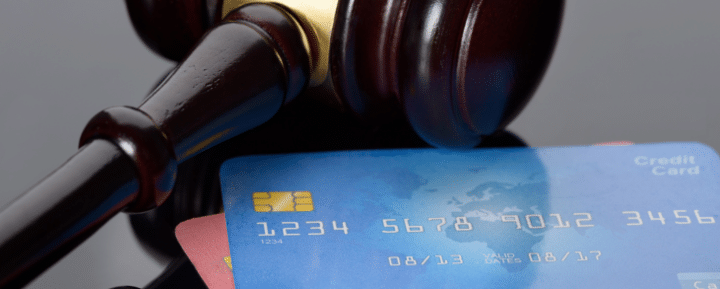Being sued over an unpaid debt is serious, and it’s crucial that you confirm the situation and respond in a prompt manner. Here’s how to know if you’re being sued for debt and the steps you can take to protect yourself and prevent future lawsuits.
Common Reasons for Being Sued for Debt
Debt collection agencies buy past-due debts from lenders and attempt to collect the outstanding balance from the borrower. If you have an unpaid debt that your original creditor sold to a debt buyer, they may choose to sue you if you refuse to pay.
There are several different types of debt that can go to collections after you default, including:
- Credit card debt
- Personal loans
- Student loans
- Medical bills
- Utility bills
- Unpaid rent
- Bank overdrafts
- Auto loan deficiency balances
- Merchant Cash Advances
Identifying the Signs of a Debt Lawsuit
Debt collectors will typically try to reach out to you about a collection account before taking drastic action. However, if they don’t succeed in collecting the amount you owe, they may file a lawsuit against you. Here are some of the potential signs you may have been sued.
You Received a Court Summons
After filing a lawsuit, the collection law firm must provide you with a copy of the complaint, along with a summons. This document provides you with key details about the debt collection lawsuit, including the deadline for when you need to file a response with the court.
The collection agency will typically hire someone to deliver the summons to you in person, called a process server, but it may mail it to you if an in-person delivery isn’t an option.
Notice from the Collection Agency
While a lawsuit isn’t official until you’ve received the summons, a collection law firm may give you notice of its intent to sue you before it starts the filing process.
It’s important to note that federal law prohibits a debt collector from threatening to do something they don’t intend to do, including legal action. So, if you receive such a notice and the agency doesn’t follow through, you can file a complaint with the Federal Trade Commission and the Consumer Financial Protection Bureau.
Steps to Confirm You’re Being Sued
If you’ve received a summons or a notice from a debt collector, you have a certain amount of time to file a written response to the court. Before you do this, it’s important to confirm the details of the lawsuit.
1. Review Any Legal Documents Received
Once you are served either by mail or in person of a debt lawsuit, carefully review the papers to ensure that you understand the details of the case.
This can help you verify that you’re the defendant and that the debt over which you’re being sued is valid.
2. Contact the Court for Verification
If a debt collector says they’ve filed a lawsuit but you didn’t receive an official summons, you can contact the court to verify that the suit has been filed. At this point, you can also notify the court that the complaint and summons weren’t properly provided to you.
3. Consult With a Legal Professional
An attorney can help verify a lawsuit and also guide you through the process of responding and defending yourself against the collection agency’s claims. They can also assist you in filing your response with the court.
Responding to a Debt Lawsuit
Once you’ve been sued for a debt, you’re required to file a response with the court by a deadline set out in the documents you receive. While it may be stressful, it’s important that you take proper steps to understand the situation and prepare a solid defense.
Understand the Complaint
It’s critical that you read through the complaint in its entirety to get a full picture of what you’re dealing with. Working with an experienced debt attorney, you can explain your situation, and you can file a response with the court together.
A debt relief attorney can help you draw up the response, but if you want to go it alone, you can reach out to your local court to get some sample response documents and other information to guide you.
Regardless of how you approach it, your response should address the facts of the case and raise your valid legal defense.
Prepare Your Defense and Answer the Complaint
Before submitting your response to the debt collection agency’s complaint, you’ll want to prepare your defense. Ultimately, how you choose to defend yourself will depend on the details of the case. However, here are just a handful of examples that may be applicable:
- Deny that the debt belongs to you, or that you’re only liable for part of the debt.
- Assert that the money owed is past the statute of limitations for your state of residence.
- Claim that the collection agency violated your consumer rights under the Fair Debt Collection Practices Act.
- Note that the collection agency didn’t properly serve the complaint and summons.
- Declare that the debt is a result of identity theft.
- Provide evidence that you’ve already paid off the debt in question.
Once you’re ready to submit your answer, it’s important to provide as much evidence as possible to support your claims.
Appear in Court
Even if you dispute the debt, it’s important to show up in court on the date listed in the summons if there is an actual court appearance— often within 20 to 30 days but check the document and call the court for clarification.
By responding to the lawsuit and showing up in court, you’ll be requiring the debt collector to prove that the debt belongs to you, that the amount it claims you owe is accurate and that they have a legal right to sue you.
In some cases, the collection law firm may be willing to settle the debt for less than what you owe to avoid a drawn-out legal proceeding, or it may drop the lawsuit altogether with insufficient evidence that the debt is not yours.
Consequences of Ignoring a Debt Lawsuit
While it may be tempting to simply hope that the debt lawsuit will go away on its own, that’s not likely to happen. The most important thing is that you provide a response and do not ignore the lawsuit. In fact, not responding to the lawsuit will typically result in a default judgment in favor of the plaintiff which in this case is the creditor who sued you.
Once the creditor gets a judgment against you, they may be able to get a judge to issue a court order to garnish your wages or your bank account to satisfy the debt or even place a lien on your bank account or property until you’ve paid the balance in full.
Because judgments are no longer listed on your credit report, they won’t have a direct impact on your credit score. However, lenders can search public records to help verify your creditworthiness, so having a judgment could affect your ability to get approved for credit in the future.
Options if You’re Being Sued
If a creditor has filed a lawsuit against you, you have a few potential options to consider.
Seek Legal Assistance
There’s nothing stopping you from responding to the lawsuit on your own, but working with an experienced debt attorney can help ensure that you protect your consumer rights and respond in an effective manner.
Settle the Debt
Depending on the situation, you may be able to convince the collection law firm to settle the debt for less than what you owe instead of dealing with the costs of a lawsuit. You can try to negotiate a settlement on your own, but you may have a better chance of maximizing your savings by working with an attorney.
File for Bankruptcy
While bankruptcy is rarely ideal, it may be necessary if your financial situation is dire. Before you proceed, however, it’s a good idea to consult with a bankruptcy lawyer, who can help evaluate your situation, see if you qualify and guide you through the decision-making process.
Preventing Future Debt Lawsuits
While you may not yet be out of the woods with a current lawsuit, it’s important to start thinking about the future and making sure you don’t get caught in the same situation again. Here are a few steps you can take to get back on the right track:
- Effective debt management: Before you take on debt in the future, think carefully about your alternatives. If you decide to borrow anyway, make sure you can comfortably afford the monthly payments. Making payments on time can help improve your credit score, making it easier to qualify for affordable credit.
- Communicate with creditors: If you experience financial hardship and you’re unable to keep up with your debt payments, reach out to your creditors to explain the situation. Many lenders provide relief options that can make your payments more affordable without putting you at risk of default.
- Monitor credit and legal notices: Use a free credit monitoring service through your bank, credit card or one of the credit bureaus like Experian, transunion or equifax or cto stay on top of your payment history. If you notice a past-due debt, try to address it quickly to avoid having it sent to collections. If a creditor does send a debt to collections, make sure you monitor all communications and respond quickly to minimize the chance of another lawsuit.
The Bottom Line
Navigating a debt lawsuit can be a stressful experience, but the good news is that you don’t have to do it alone. When you hire an experienced financial attorney like our team at Tayne Law Group, you’ll get expert legal advice and guidance throughout the debt and collection process. Request a free phone consultation to learn more about our services and how we can help you.














